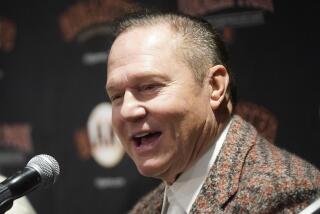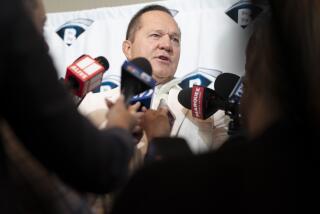A Sheep in Woolf’s Clothing
- Share via
We all know what sports agents are like, right? Nonstop talkers, clouds of cigar smoke, fur coats, all those gold chains, no socks, tasseled loafers, office in Century City, phones flashing, call waiting, call everybody “sweetheart,” a manicure positively once a day, hair trimmed weekly, lots of big talk, I-made-Joe-Montana-type of thing.
And then, there’s Bob Woolf. Bob comes on like his own secretary--or a guy who’s about to borrow money. He seems embarrassed to be taking up your time. He’s usually dressed like a guy going to his confirmation or bar mitzvah. Shoes shined and laced, tie matching his socks, hair neat but not razor cut, looks more like a cut he got at a shop advertising “10 Barbers, No Waiting.”
Bob knows Joe Montana made him. Bob goes in and asks for a contract for his clients with an almost pained look on his face, as if this were something he hated to do to an old friend like you. Bob Woolf always seems to have his hat in his hand and to hate being the bearer of bad news.
That’s his secret. He manages to convey the impression he and the moguls are partners concluding a mutually advantageous deal.
It’s hard to believe he was really the first of the sports agents. He more or less invented the profession. By accident.
It might never have happened if Earl Wilson had not pitched a no-hitter for the Boston Red Sox in 1962. Bob Woolf was a simple tax attorney at the time, but the added demands on Wilson’s time and the call for personal appearances brought him to his tax consultant for advice. Woolf stepped into a new era.
It was like Balboa discovering the Pacific. He suddenly realized that professional athletes, unschooled and unskilled in negotiations, were selling their talents for 10 cents on the dollar. Television had bumped the ante and the pot in this high stakes game, but the talent was the last to know.
Show business professionals had long since had their famous 10 percenters. Old hands in Hollywood will tell you they ruined the studios. But there are a lot fewer actors in the Motion Picture Home today because of Myron Selznick, Abe Lastfogels and others like them.
Earl Wilson, the pitcher, was so impressed by Woolf’s advice--and negotiating skill--he passed the word in the Red Sox clubhouse. Soon, Woolf was representing Carl Yastrzemski, no less, Reggie Smith and other Boston stars. As the stars got traded, they took word of this new kind of professional aid with them.
Woolf began to add Boston Celtic basketball players--John Havlicek, Sam Jones, Wayne Embry.
If they ever built a wing on the Hall of Fame for agents, Woolf would go in as quickly as Ty Cobb. No one has ever seen him frown. The only way to know the negotiations are not going his way is when he smiles and says, “Let’s talk abut that.”
Woolf has never pounded a desk or slammed down a phone in his life. He never speaks above a half-whisper. He wouldn’t scream if he saw a ghost. He’d probably sign him for two weeks in Vegas.
Not all his clients kick or throw a ball. He represents the concert rage, New Kids on the Block, to say nothing of Joan Kennedy and the daughter of the late president of Egypt, Camelia Sadat.
He eschews intimidation, even when he represents such an intimidating force as John Matuszak, and his negotiations are as decorous as the Treaty of Ghent.
He got $8.3 million for Doug Flutie, an undersized college passer who had about as much chance of being first string in the NFL as Toulouse-Lautrec. Flutie was gifted but everybody knew that someone whose passes had to go straight up for the first five yards before they could go anywhere had no chance to complete throws against the San Francisco 49ers’ secondary. Flutie was about five inches short of greatness, but Woolf marketed him like the Kohinoor diamond.
I met Woolf when he was handling Jim Plunkett, then fresh out of Stanford and signed with the New England Patriots. We met in Woolf’s office high above the Charles River and I remember thinking that this mild-mannered, always-smiling lawyer was far from the high-powered agents I had come to know in Hollywood. They took great pride in their adversary relationships with the studio heads. Bob acted as if he and the Patriots’ owners were bridge partners, trying to match hands.
When Larry Bird was going to turn professional and a group of Terre Haute businessmen decided to screen prospective agents, a lot of agents were insulted to be summoned to job interviews. Woolf went cheerfully. As he does to everything.
He won out over 65 candidates and today Larry Bird is his next-door neighbor and close friend.
The deal was sealed when someone at the final screening wanted to know how Terre Haute’s other famous citizen, pitcher Tommy John, fared in salary. Bird cut in, “I don’t care to know what Tommy John makes--or have anyone at this table know what he makes.”
Woolf won Bird with his presentation, but Bird won Woolf with that simple dignified statement.
Woolf has been as important in many ways as Faneuil Hall. Although his business has branched out to several other cities on both coasts and as far south as Florida, his temperate negotiations have kept major athletes in the Hub City even in this era of runaway free agency.
Like all good agents, Woolf will not deal with an athlete who reneges on his signature and demands renegotiation before the ink is dry.
“I tell them their signature is my signature and I am very particular that when I sign something, I do what I say I will.”
Woolf has written a book, “Friendly Persuasion,” which is a guide book to modern sports and theatrical negotiations. It is a recommendation on how to take the sting of hostility out of negotiations.
“You don’t have to be disagreeable to disagree,” he writes. “A contract negotiation is not a prize fight. Be self-effacing.”
Woolf’s personal hero is “Columbo,” the TV detective played by Peter Falk. You make others feel superior. Leverage is getting the other fellow to underestimate you.
Woolf, though, has long since blown his cover. No one underestimates him now, least of all his hundreds of clients ranging from violinist Itzak Perlman to politician Michael Dukakis.
As Billy Sullivan of the Patriots once said, “It’s not hard to deal with Woolf. When he sits down to negotiate, he lets you keep the team.”
More to Read
Go beyond the scoreboard
Get the latest on L.A.'s teams in the daily Sports Report newsletter.
You may occasionally receive promotional content from the Los Angeles Times.










